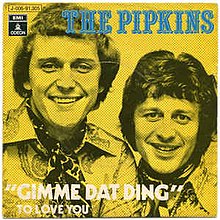Gimme Dat Ding
| "Gimme Dat Ding" | |
|---|---|
 | |
| Single by The Pipkins | |
| from the album Gimme Dat Ding | |
| B-side | "To Love You" |
| Released | May 1970 |
| Genre | Novelty, music hall |
| Length | 2:10 |
| Label | EMI |
| Songwriter(s) | Albert Hammond and Mike Hazlewood |
| Producer(s) | John Burgess |
"Gimme Dat Ding" is a 1970 popular UK song, of the novelty type, sung by "one-hit wonder" The Pipkins, and written and composed by Albert Hammond and Mike Hazlewood. Released as a single, it is the title selection of an album which The Pipkins recorded and released on the EMI Columbia Records label. The song also appeared on the compilation of the same name, which The Pipkins shared with another up-and-coming UK group The Sweet. It has also been included on many other compilation albums. The song was arranged by Big Jim Sullivan.
Chart history[]
The song peaked at number 6 on the UK Chart in March/April 1970. It reached number 7 in Canada, number 9 on the US Hot 100 and number 20 in US Easy Listening.[1] It did best in New Zealand, where it reached number 1.[2]
Weekly charts[]
|
Year-end charts[]
|
Song profile[]
"Gimme Dat Ding" is a call-and-response duet between a deep, gravelly voice, that of Tony Burrows, and a high tenor, that of Roger Greenaway. The voices are said to represent a piano and a metronome.
When Hammond and Hazlewood wrote and composed "Gimme Dat Ding," it was one selection from their musical sequence "Oliver in the Overworld," which formed part of the British children's show Little Big Time, hosted by Freddie and the Dreamers; this narrated a surreal story of a little boy seeking the parts to mend his grandfather clock. The lyrics of the song relate to this story, the song being sung by a metronome who has been expelled by the Clockwork King; the "ding" has been stolen from the metronome by the "Undercog." The original version of the song, as performed by Freddie Garrity, was released on the album Oliver in the Overworld in 1970.
Cover versions[]
As early as 1970, a Czech version was released as a vinyl single (lyrics: silence-loving man complaining about his noisy female neighbour singing, in Czech, "gimi det ding").[16] The Norwegian vocal group Bjelleklang covered the song on their album YppeRu’ dOnK in 1994. The song was called Gummihatt (Swing) which is Rubberhat (Swing) in English.[17]
In the UK, interest in the song resurfaced in the 1990s when the Maynards confectionery company used it in a popular television commercial for their Just Fruits fruit pastille and fruit gum range between 1992 and 1994, which led to the song reappearing on radio playlists during that era. In 1997, Dairylea also used the song in two advertisements in the UK.[citation needed]
An instrumental version arranged by Ronnie Aldrich was frequently used as background music during comedy sketches in The Benny Hill Show.[citation needed]
References[]
- ^ Whitburn, Joel (1993). Top Adult Contemporary: 1961–1993. Record Research. p. 188.
- ^ Flavour of New Zealand, 13 July 1970
- ^ Kent, David (1993). Australian Chart Book 1970–1992 (illustrated ed.). St Ives, N.S.W.: Australian Chart Book. p. 233. ISBN 0-646-11917-6.
- ^ "The Irish Charts – Search Results – Gimme Dat Ding". Irish Singles Chart. Retrieved June 26, 2018.
- ^ "Jaaroverzichten – Single 1970" (in Dutch). Single Top 100. Hung Medien. Retrieved November 6, 2018.
- ^ Flavour of New Zealand, 13 July 1970
- ^ "SA Charts 1965–March 1989". Retrieved 5 September 2018.
- ^ "Official Charts Company". Retrieved 2018-11-05.
- ^ Joel Whitburn's Top Pop Singles 1955–1990 - ISBN 0-89820-089-X
- ^ Whitburn, Joel (1993). Top Adult Contemporary: 1961–1993. Record Research. p. 188.
- ^ Cash Box Top 100 Singles, July 18, 1970
- ^ "Item Display - RPM - Library and Archives Canada". collectionscanada.gc.ca.
- ^ "Google Translate".
- ^ "Top 100 Hits of 1970/Top 100 Songs of 1970". musicoutfitters.com. Retrieved 1 December 2017.
- ^ http://tropicalglen.com/Archives/70s_files/1970YESP.html Archived 2019-07-22 at the Wayback Machine Cash Box Year-End Charts: Top 100 Pop Singles, December 26, 1970
- ^ https://www.youtube.com/watch?v=WWFnN_xpwZ4
- ^ https://www.youtube.com/watch?v=O3bf6xl66Xc
- 1970 songs
- 1970 singles
- The Pipkins songs
- Songs written by Albert Hammond
- Songs written by Mike Hazlewood
- Novelty songs
- EMI Records singles
- Tony Burrows songs
- Number-one singles in New Zealand